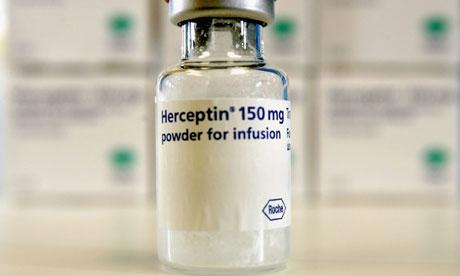
Herceptin faces UK competition within months
pharmafile | April 11, 2014 | News story | Manufacturing and Production, Medical Communications, Research and Development, Sales and Marketing | Biocon, Herceptin, Hospira, Perjeta, breast cancer
Roche’s blockbuster breast cancer drug Herceptin may soon be under threat from copycat treatments after a court in the UK overturned two patents for the medicine.
Justice Colin Birss ruled that the patents for Herceptin (trastuzumab), which relate to the dosages and composition of the drug, were invalid in a ruling in London this week.
The decision will pave the way for US-based biosimilar firm Hospira to market its own version of the biologic as the primary patent on Herceptin expires on 28 July in Europe.
The drug’s US patent – where it makes most of its revenue – is still safe however, and will not be exposed to generic competition until 2019.
But Hospira could be quick to launch a copycat version of the drug, known as a biosimilar, as in January the firm and its South Korean partner Celltrion gained approval in its home country for a Herceptin copy known as Herzuma.
The drug is expected to sell for around 70% of the price of the Roche’s patent medicine and means that the company already has a biosimilar version of the drug ready for market.
Celltrion and Hospira have teamed up to develop eight biosimilar drugs and they have already gained a European approval for a biosimilar version of Janssen’s’ blockbuster anti-inflammatory treatment Remicade (infliximab), which Hospira is marketing in Europe under the brand name Inflectra.
Biosimilars are not as easy to make as generic drugs as they usually require a certain amount of limited clinical trial data and are typically biologics, meaning their development and production are more complicated, and thus more costly.
But such is the revenue from biologic medicines this can be a lucrative area for drugmakers even though there is greater upfront cost than with a generic, especially in emerging markets.
In fact Roche is currently fighting a legal battle with Biocon and Mylan in India to stop a biosimilar version of Herceptin from being approved there.
This comes as biosimilar firms look to sell into high but generally poorer population markets with more affordable medicines.
Big seller and game changer
Herceptin is currently the tenth best-selling drug and generated CHF6.1 billion ($6.9 billion) for Roche last year.
The advent of the medicine in the late 1990s ushered in a new era of personalised drug treatment as it focussed on a particular genetic sub set of patients, notably those over- expressing HER2.
It also helped Roche become the world’s biggest maker of cancer drugs and diagnostic tests.
The drug was originally developed by US biotech Genentech which is now a wholly-owned subsidiary of the Swiss major, a takeover and collaboration that has been key to its success.
Roche does have a next-generation breast cancer drug in the form of Perjeta (pertuzumab) which can be used with Herceptin and docetaxel chemotherapy in patients with previously untreated HER2-positive metastatic breast cancer.
Meanwhile Kadcyla (trastuzumab emtansine or T-DM1) was also approved last year, and combines Herceptin and chemotherapy in one molecule, and is the first antibody-drug conjugate for treating HER2-positive metastatic breast cancer.
But these two medicines will do little to fully offset the loss of the $6 billion a year Herceptin has been bringing in: Perjeta’s peak annual sales estimate is just $1.8 billion whilst Kadcyla is less at $1.1 billion, meaning both together will not even offset half of the loss expected from Herceptin.
This is the main reason why Roche will want to hang on to as much revenue from its ageing drug as possible, and not lose out in valuable market share to biosimilars.
Ben Adams
Related Content

Bio-Sourcing and Zerion Pharma receive 1.3m euros in funding for joint breast cancer project
Bio-Sourcing and Zerion Pharma have announced that their collaboration to develop an oral form of …

Biocartis announces breast cancer research collaboration with US Mayo Clinic
Biocartis has announced a research collaboration with Mayo Clinic in the US, aiming to develop …

Novartis receives SMC approval for early breast cancer treatment
Novartis has announced that its treatment for early breast cancer, Kisqali (ribociclib), has received approval …






